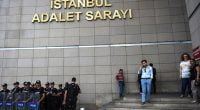Erdoğan raising new army of political Islamists

Date posted: June 3, 2014
ABDULLAH BOZKURT
The dramatic shift in the main parameters of educational policies and youth engagement programs reflects the strong desire of Erdoğan, the top political Islamist in Turkey, to raise a new generation of young political Islamists to support his ideologically motivated political party as well as to sustain his legacy when he exits from politics one day. For that to happen, the level and intensity of the indoctrination of young students must be ratcheted up at the expense of teaching science, math and other essential academic subjects. In this politicized campaign, Islam is not a religion, per se, but rather, it is used and abused for self-serving ideological inclinations, a practice that will damage the spirit of tolerance and respect for others in the next generation.That is how the mullahs in Iran, the architects of politically driven Shiite ideology, have been able to cling to power since the revolution of 1979. They replicated what the former Soviet Union, the predecessor of today’s Russia, did when the highly oppressive regime praised and venerated the ideology of communism above everything else in schools and universities, defying reason, logic and critical thinking. Perhaps Erdoğan and his band of brothers in political Islam have discovered that education is the main conduit to implant political Islamist ideology in Turks, a predominantly Sufi-oriented society. Erdoğan knows that the orthodox and rigid definition of religion in the political Islamists’ ideology does not resonate well with most in Turkey and, in fact, met with the stern disapproval of Turks for centuries, yet he will push for the survival of this ideology.The main casualty of this newly revamped education policy of the Erdoğan government will be the decades-long efforts to overcome fear and ignorance among Turks and to promote respect, diversity, pluralism and mutual appreciation. If political Islamists somehow succeed in this endeavor, it will perpetuate strong anti-Western discourse for generations in Turkey, hampering efforts at dialogue to bridge the divide between the Muslim world and the rest of the world. The takeover of Islamists in Turkey’s ruling Justice and Development Party (AKP) originally represented a progressive umbrella platform, but in 2011 the government moved into activism for a political Islamist ideology and away from rhetorical and substantive moderation.Legislation approved in Parliament on March 1 gave the government sweeping powers to overhaul the Ministry of Education from the top down, representing a drastic restructuring in education, the likes of which were not seen even in extraordinary periods such as during military coups. Law No. 6528 terminated the employment of thousands of senior officials in the ministry, including the president of the Ministry of Education’s Board of Education and Discipline, the board’s other members, the ministry’s deputy undersecretaries, the general directors, the chiefs of education branches and the provincial education directors of all 81 provinces. Some 100,000 school principals and vice principals were also sacked after the bill was adopted.The hasty changes in the education system, made without consulting education specialists, unions, or the opposition parties, are aimed at creating a political recruitment program, one that will cater to political Islamists in Turkey. Now, the newcomers to those vacated positions will play a significant role in the development of the public school curriculum, most notably the religious education components. What is more, Erdoğan also turned the powerful Directorate of Religious Affairs (DİB), with some 100,000 employees, over 80,000 mosques and a huge budget, into a political tool to communicate the ruling party’s messages via press statements and Friday sermons. The DİB was also used as a steppingstone by the government; a vast number of political appointees were transferred from the DİB to other state institutions. The publicly funded DİB, which only represents Sunnis, has now become a mouthpiece of the Erdoğan government, justifying whatever policy decisions the ruling party’s cronies decide to implement.
It is a hair-raising development that this political Islamist cabal has been able to lay siege to the Sufi-oriented and moderate Muslim thinking that has the allegiance of the overwhelming majority in Turkish society. Erdoğan has not fully succeeded in his endeavor yet because of the secular tradition in the education system, the existence of restraining measures in the state, such as the judiciary and the military as well as the vibrant media, civic society and diversified leadership in Muslim communities across Turkey. But he will not give up easily on his efforts to consolidate more power in government by weakening state institutions and eroding checks and balances while simultaneously monopolizing his undeclared leadership in religion by coopting conservative and faith groups with lavish offers or cowing them into submission with threats and intimidation.
Unfortunately, the Erdoğan government’s Islamist policies will hinder the education system from performing the role of fighting against intolerance, hate speech, racism and xenophobia in society with an emphasis on rights staring at an early age. Moreover, the sham education reform under Erdoğan’s rule will be permitted to clear all hurdles in its path so that political Islamist ideology may develop deeper roots in Turkey. A series of highly controversial education initiatives, such as banning privately run schools that assist students to prepare for college and university entrance exams and Erdoğan’s continuous pleas for his supporters to withdraw their children from the schools associated with the Islamic scholar Fethullah Gülen-inspired Hizmet movement have all been aimed at advancing Erdoğan’s agenda of raising “a vengeful religious youth.”
However, Erdoğan obviously misjudged Gülen. The prime minister expected the well-respected, 73-year-old Muslim scholar — who has expressly stayed away from politics throughout his life in order to preserve Islamic principles and values rather than enter an environment of political bickering, factionalism and the “end justifies the means” approach of political Islamists — to take a back seat and remain passive in the face of the encroachments of political Islamists who merely want to drill slogans into the minds of Turkish youth using the name of religion. Perhaps Gülen had to take a stand, not seeking power for himself at his advanced age, but to protect the fundamental teachings of Islam that emphasize humility, moderation, justice, accountability and transparency in governance.
Erdoğan’s attempt to put a stranglehold on religion with Iranian-style indoctrination and imposing political Islam’s values on Turkish society has not been able to shake the bedrock of power in Sufi-dominated Turkish society. That is why he has grown impatient and frustrated, prompting him to replace education ministers frequently and appointing an undersecretary to do his bidding directly. Erdoğan hopes to sustain his rule by dividing society further into sectarian and ideological camps with the hateful rhetoric he employs against Gülen, the media, business and civic groups at home and his constant bashing of Turkey’s Western allies, especially the US, as well those in the Middle East and the Gulf.
The inflammatory xenophobic hostility and anti-Western sentiment leads to the potential radicalization of Turkish youth. Erdoğan needs a restless generation to channel voters’ growing dissatisfaction and disillusionment with his government, as we saw in his desperation to find scapegoats for allegations of corruption, in order to shift the blame. The youths who show up at Erdoğan’s rallies wearing shrouds and chanting slogans like “Tell us to die for you, we will die; tell us to hit, we will hit,” something never before seen in Turkey, unfortunately raises just such a specter of radicalization.
The well-organized and hard-working members of Hizmet, savvy in modern education that promotes interfaith and intercultural dialogue in the early years of schooling, stand in the way of Erdoğan’s political Islamist ideology. That is, perhaps, one of the main reasons why Mr. Gülen has topped Erdoğan’s enemy list recently. However, there is no need to be pessimistic about Turkey’s prospects at all. Erdoğan’s new emphasis on political Islamist indoctrination in religious education in public schools — a divisive issue at the best of times — will surely fail, given the vibrancy and dynamism of Turkish society, but it will inflict some damage in the meantime.
Source: Todays Zaman , June 2, 2014
Tags: Democracy | Education | Fethullah Gulen | Hizmet and politics | Hizmet-inspired schools | Turkey |
























